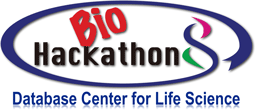Overview
Exchange format
It already exists an standard exchange format: PSI-MI. Two possibilities:
- PSI-MI XML
- PSI-MI TAB (tabulated)
- Standard
- Expanded (IntAct) - Additional columns to the standard, containing information like bait-prey, types, cross-references...
Service Providers
Service providers at the Hackathon
- IntAct (Bruno Aranda, EBI)
- DIP (Lukasz Salwinski, UCLA)
- STRING (Michael Kuhn)
- ... (please add yourself)
Service consumers
- Cytoscape (Keichiro Ono)
- CellDesigner (Akira Funahashi, Keio Univ. & SBI)
- ... (please add yourself)
Existing Web Services
IntAct Web service
- IntAct already provides a very simple SOAP based web service ( http://www.ebi.ac.uk/~intact/devsite/remote/binarysearch_ws.html)
- NCBI Entrez Gene has meta-database of interactions (MINT, BioGrid, and BIND), but access to these dataset is hard due to API design.
Existing Clients
- Please visit this page for Cytoscape clients and its visualizations.
Objectives
Improve the existing IntAct web service
Note: the IntAct web service is in fact a web service that searches on a PSI-MI TAB file that contains all the interactions present at IntAct. All the (java) code generated at IntAct is open-source and licensed under the Apache Commons License 2.0. It means that this web service implementation could be used over any PSI-MI TAB file (not just the IntAct ones).
- Taverna client
- BioMoby
- Check use-cases:
- Get interaction or partners not only using Uniprot IDs (the primary identifiers for interactors used in IntAct)
Note: during the week, a common WSDL for interaction web services has been defined, so this section will be accomplish by implementing such a service.
Define a common Interaction Query Language
It would be useful to have a common query language for interactions. Options:
- PSICQUIC - attempt to create a REST-based query language.
- A common WSDL, based on the original ideas of PSICQUIC and new requirements, will be defined in the BioHackathon?
- Lucene based searches over PSI-MI tab files - this is what is currently used in IntAct.
- This option is really powerful. A method allowing queries will be part of the common WSDL. However, it is not clear if all providers will implement this method (IntAct will, well, it is actually using it :) )
Define specific use-cases
Cytoscape, as active consumer, has a bunch of use cases that can be a starting point to discuss how interaction data could be mined/queried.
Interaction DAS Server
Possibility: http://www.dasregistry.org/extension_interaction.jsp
Problems: it does not comply neither with the PSI-MI specification nor with the DAS one.
Due to time constraints, no effort will be dedicated in the BioHackathon? to this.
Other Resources
The minimum information required for reporting a molecular interaction experiment (MIMIx)
Important reminder
This is a wiki. Please, participate with your thoughts/additions/comments! :)
Progress
Day 2
- Trying to define a web service with common interface for all the Interaction Service Providers.
- The methods should be in the default exchange format (PSI-MI XML).
- Problem: This means dealing with potentially huge files (about 30 Mb for 2000 interactions, and databases such as IntAct? contain 100000+ and increasing exponentially).
- Solution: unknown
(using URIs?)(comment from Day 4: pagination of the results will be implemented in the first version)
- Solution: unknown
Day 3
Client Side Topics
- Client (Cytoscape) code modifed to accept PSI-MI EntrySet object. This is based on existing PSI-MI reader in Cytoscape.
- PSI-MI Reader should be modifed to read more details in the object. (Currently, some of the details are skipped.)
- Need to add a switch to import minimal dataset (graph information only. No attributes) or full detail.
Day 4
PSICQUIC - Common Web Service interface for all Interaction providers
A initial set of methods have been defined and can be seen in the latest WSDL attachments. Basically, the result of the search methods will return EntrySet (MIF) or MITAB format, dependending on the return type format parameter passed to the method. Some metadata about the query will be returned too (e.g. total results, first result index, block size, expirationDate...). The PSIMITAB format will be output by the methods wrapped in very simple XML (mitab-1.0.xml schema attached), that defines rows and columns instead of returning just plain strings that need to be parsed.
Client Side
- Since PSI-MI annotations are based on controlled vocabulary, Cytoscape can provide pre-defined Visual Style for the networks from PSICQUIC services. (See the example below)
- Attributes are splitted into smaller parts instead of big "XREF" list attributes.
Day 5
Client Side
- Use Ontology Lookup Service (OLS) to import metadata for PSI-MI ontology terms. This information will be used to add descriptions for attributes.
- OLS will be used to extract pre-defined terms such as interaction detection methods etc. This will be used to create Visual Styles dynamically.
Attachments
-
mitab-1.0.xsd
 (1.1 KB) - added by baranda
17 years ago.
(1.1 KB) - added by baranda
17 years ago.
schema that defines how a PSIMTAB file is mapped to XML in the response
-
PSIMI_Style1.png
 (318.4 KB) - added by kono
17 years ago.
(318.4 KB) - added by kono
17 years ago.
Sample Style for PSI-MI interaction data
-
PSIMI_OLS_COMBO.png
 (352.5 KB) - added by kono
17 years ago.
(352.5 KB) - added by kono
17 years ago.
Visualization of PSI-MI data with metadata from OLS
-
BioHackathon - summary.ppt
 (91.5 KB) - added by baranda
17 years ago.
(91.5 KB) - added by baranda
17 years ago.
Summary and outcomes of the group
-
BioHackathon - Interaction Networks.pdf
 (205.3 KB) - added by baranda
17 years ago.
(205.3 KB) - added by baranda
17 years ago.
Outcome in pdf format
